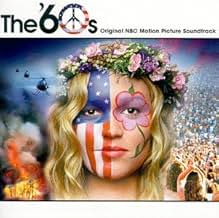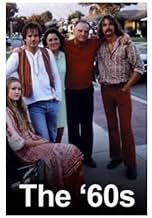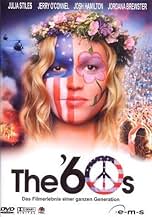AVALIAÇÃO DA IMDb
6,9/10
2,7 mil
SUA AVALIAÇÃO
Adicionar um enredo no seu idiomaThe events of the 1960s affect the lives of two families, one white and one black.The events of the 1960s affect the lives of two families, one white and one black.The events of the 1960s affect the lives of two families, one white and one black.
- Indicado para 3 Primetime Emmys
- 2 vitórias e 10 indicações no total
Explorar episódios
Avaliações em destaque
What the movie The 60s really represents (to those of us who growled around in the belly of America in those times) is the turbulence and diversity of the decade. Despite the exaggerated, stereotyped characters, the genuineness of the issues remains clear.
Not only were those radical times of change, but also very confusing times. Two basic things changed our world then: the 1964 Civil Rights Act, and the overwhelming influence of the media. Those two new freedoms began social changes that soon became institutionalized.
From chaos came sensitivity, from disorder came values. Bear in mind however, that the bulk of Americans were not involved in this... they worked, they played, they watched the news... and slowly they became effected by the efforts and struggles of the minorities... the Civil Rights workers, the Political Activists, the Anti-War efforts, the War on Poverty....
The representation of the power of the press and TV in particular, was well reflected, although the conflict between the general public's attitude and those seeking to change things was at best ignored... and at worst, misrepresented.. Middle class Americans weren't all standing around angrily holding baseball bats, or disowning their wayward daughters. They were confused too. Let us not forget how Folk Singers suddenly became Protest Singers, and how The Beatles began an onslaught that killed the Folk-Protest Movement. There are no Beatle songs in the movie, or even any mention of them.
I think if you didn't live the decade, you might not have a sense of what the movie is about, the overall picture is a bit dim. At one point I held down a steady job while my sister lived at the Hog Farm Commune and went to Woodstock. At another point I was in Haight Asbury and in the Detroit Riots while she worked and played the housewife in Maine and Connecticut. Roles were constantly changing.
The movie depicts three siblings of a middle class family. They represent the hippie child, the political activist, and the active military personnel. Dad represents the typical attitudes, and mom represents the voice of reason, tolerance, and sometimes compromise... for the sake of peace.
The Black family comprises a minister and his son... disproportionately, I think. I assume the producers knew all the variables and had to settle on limitations, or else the film would have become a long, boring, documentary. Dad's message was that anger produces bitterness, and bitterness produces chaos. It was clearly a message directed to today's youth.
We are looking at a unique solution to social problems, and also how issues divide us... The 60s were unusual in that way, and only the Roaring 20s compare. In other words, this movie has a moral after all. In the end, it is our Collective Individualism that survives. Put that in your oxymoron list.
Everyone was a God, a Guru, or a free-spirited genius in the 60s. It was a time of magic and madness. No one will ever nail the 60s down right... it was too diverse (this movie is close). At least we can say we are not ashamed of it, that we learned and grew from it, and that for once, a generation shaped and changed America... for the better.
Not only were those radical times of change, but also very confusing times. Two basic things changed our world then: the 1964 Civil Rights Act, and the overwhelming influence of the media. Those two new freedoms began social changes that soon became institutionalized.
From chaos came sensitivity, from disorder came values. Bear in mind however, that the bulk of Americans were not involved in this... they worked, they played, they watched the news... and slowly they became effected by the efforts and struggles of the minorities... the Civil Rights workers, the Political Activists, the Anti-War efforts, the War on Poverty....
The representation of the power of the press and TV in particular, was well reflected, although the conflict between the general public's attitude and those seeking to change things was at best ignored... and at worst, misrepresented.. Middle class Americans weren't all standing around angrily holding baseball bats, or disowning their wayward daughters. They were confused too. Let us not forget how Folk Singers suddenly became Protest Singers, and how The Beatles began an onslaught that killed the Folk-Protest Movement. There are no Beatle songs in the movie, or even any mention of them.
I think if you didn't live the decade, you might not have a sense of what the movie is about, the overall picture is a bit dim. At one point I held down a steady job while my sister lived at the Hog Farm Commune and went to Woodstock. At another point I was in Haight Asbury and in the Detroit Riots while she worked and played the housewife in Maine and Connecticut. Roles were constantly changing.
The movie depicts three siblings of a middle class family. They represent the hippie child, the political activist, and the active military personnel. Dad represents the typical attitudes, and mom represents the voice of reason, tolerance, and sometimes compromise... for the sake of peace.
The Black family comprises a minister and his son... disproportionately, I think. I assume the producers knew all the variables and had to settle on limitations, or else the film would have become a long, boring, documentary. Dad's message was that anger produces bitterness, and bitterness produces chaos. It was clearly a message directed to today's youth.
We are looking at a unique solution to social problems, and also how issues divide us... The 60s were unusual in that way, and only the Roaring 20s compare. In other words, this movie has a moral after all. In the end, it is our Collective Individualism that survives. Put that in your oxymoron list.
Everyone was a God, a Guru, or a free-spirited genius in the 60s. It was a time of magic and madness. No one will ever nail the 60s down right... it was too diverse (this movie is close). At least we can say we are not ashamed of it, that we learned and grew from it, and that for once, a generation shaped and changed America... for the better.
I never actually thought anything could make me understand the police brutality that occurred during the Democratic Convention in 1968 in Chicago, but this one sure comes close. The awful human beings that rioted in the public parks, with their whining and their complaining and their drug use and violence seemed richly deserving of the things they got.
If this movie is worth anything, it's instructive as to how history can be distorted to suit a particular kind of political and cultural agenda. It is very sympathetic to those for which little sympathy is deserved. It suits those who actually make these movies to try and justify the things that they largely did during the past, even thought the rest of the country didn't.
The heroes of the movie end up being the villains, and those who grew up in luxury and refused responsibility or respect end up being the applauded. It's utterly mystifying.
The characters involved here are cardboard, with high school drama dropouts as their creators. It's undeniably hard to create a movie that can depict and entire decade and its spirit, but this one not only fails, but seems like it's not even trying. Play some sixties rock music, show a menagerie of hippies, a melange of pot smoke, and a montage of video clips from a truly tortuous time.
Take the advice of the insightful reviewer previously and read up on what happened during this time, the real events, the real issues. Bobby Kennedy wasn't a saint (he's actually the one who ordered Martin Luther King to be bugged while he entertained prostitutes), and Barry Goldwater wasn't the devil, nor the reverse--but it's hardly the way the makers of this swill would have people believe.
If this movie is worth anything, it's instructive as to how history can be distorted to suit a particular kind of political and cultural agenda. It is very sympathetic to those for which little sympathy is deserved. It suits those who actually make these movies to try and justify the things that they largely did during the past, even thought the rest of the country didn't.
The heroes of the movie end up being the villains, and those who grew up in luxury and refused responsibility or respect end up being the applauded. It's utterly mystifying.
The characters involved here are cardboard, with high school drama dropouts as their creators. It's undeniably hard to create a movie that can depict and entire decade and its spirit, but this one not only fails, but seems like it's not even trying. Play some sixties rock music, show a menagerie of hippies, a melange of pot smoke, and a montage of video clips from a truly tortuous time.
Take the advice of the insightful reviewer previously and read up on what happened during this time, the real events, the real issues. Bobby Kennedy wasn't a saint (he's actually the one who ordered Martin Luther King to be bugged while he entertained prostitutes), and Barry Goldwater wasn't the devil, nor the reverse--but it's hardly the way the makers of this swill would have people believe.
This mini-series did an excellent job of portraying the sixties, with a minimum of exaggeration and a fairly even-handed presentation of the differing sides. It did far better than Forrest Gump in this respect. I have shown it to my children, so that they can see this historical period more vividly than just by reading a book in school. I thought it was extremely well done, and I can't understand why there is so little information given for it (cast, crew, etc.). It would be nice to know who played what...
As a 17 year old who gets to always hear about the 60s second-hand this movie "took" me to the 60s. I really liked that all the kids in the Herily (sp?) family encompassed many of the kids of that time. One was a Vietnam vet, one an activist against the war, and one a hippie who ends up at Haight-Ashbury and the Hog Farm. From what I have heard this movie is very accurate and even noted the date and year of an event. The black family was great and the idea that they participated in the sit-ins and Freedom marches, and then to live in Watts, LA during the Watts riots was a great idea. I thought the climax was a great mixture of events that took place in 1965. I know there were a lot of stereotypes, but how else would we learn about the 60s with out a movie that encompassed all the feelings, looks, and ideas of the time. I loved the music but was upset that only one song was on there by The Beatles. Obviously, they forgot what an impact the Beatles had on the American culture and leaving it out was a mistake. All the other music was GREAT and I love the song by Bob Dylan and Joan Osbourne. All in all this movie was great. And I hate that people say there was too much romance and love, but hey, it was the 60s. Sex and drugs was a prominent thing in that era. You can't forget it. I give it a 9.5/10, for leaving the Beatles out.
Oh well - this series is crap, i mean, absolutely. They should have been awarded for worst script, worst acting, worst interpretation of history, worst use of stereotypes, worst use of a fake mustache in an attempt to duplicate the Tom Cruise of the 4th July - but, miracle!, making him walk - worst cinematography, worst art directing, worst costumes, worst editing, worst leftism (i mean, this is how you lived your '68? You shoulda stayed home! C'mon dude, where's the politics), worst use of Bob Dylan clips (clips from the seventies in a sixties movie?). If you wanna be a die-hard nostalgic hippie substantially not caring about most of the political facets of it, if you can't read a book or you'd fall asleep, if you hate documentaries, if Woodstock to you is a little yellow bird, if you want to see some 80s haircuts misplaced in time, well this might be for you. I mean, Hair was a musical, a fantastic movie, it was not intended to be a portrait of a generation - but hell, it was 1000 times more realistic than this. Hey, if all the people in the USA during the sixties were dumb as the characters of this crap i think at least somebody had a good reason to fly to Vietnam: not hearing anything anymore from dummies country! I guess the sixties were definitely better than this, but, i mean, what was the worst year in the whole history? The less interesting year of all time? I don't know, but put that year in the hands of a medium-level director and he'll do something more enjoyable. Shame on whoever worked on this - none of you did a good job!
Você sabia?
- CuriosidadesActors Donovan Leitch Jr. and Carnie Wilson are the respective children of musicians Donovan and The Beach Boys' singer and composer Brian Wilson, both of whom are heard in the soundtrack. Jason Nesmith, son of ex-Monkee Michael Nesmith, also appears.
- Erros de gravaçãoAt the end during the BBQ, the mother asked "How's my boy today?" there is a boom mic visible.
- Citações
Bill Herlihy: Are you still my baby?
Katie Herlihy: No, dad, I grew up. But I am still your daughter.
- Versões alternativasA scene where Katie and her friends gathered in front of her television to watch The Beatles performance on the Ed Sullivan show was originally shown in NBC's first broadcast of the mini-series but ended up getting cut out of all the home video versions of the film (including NBC's own 2 tape set which could only be ordered straight from the network). The scene is also missing from later presentations of the film on networks such as VH1. In the scene Katie and her friends sit on the floor in front of the television and scream in delight at the sight of The Beatles while Katie's brother, Michael, sits behind them secretly trying to brush his hair down so that he can look like the famous quartet.
- ConexõesFeatured in The 51st Annual Primetime Emmy Awards (1999)
Principais escolhas
Faça login para avaliar e ver a lista de recomendações personalizadas
- How many seasons does The '60s have?Fornecido pela Alexa
Detalhes
- Data de lançamento
- País de origem
- Idioma
- Também conhecido como
- Los '60s
- Locações de filme
- Redlands, Califórnia, EUA(Columbia campus scenes)
- Empresas de produção
- Consulte mais créditos da empresa na IMDbPro
Contribua para esta página
Sugerir uma alteração ou adicionar conteúdo ausente



































